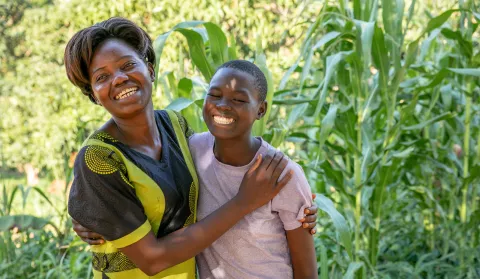Let us get all our children back to school
The effective action is to keep learners and teachers safe and keep schools open

We are happy schools in South Sudan have reopened earlier. However, we know many children are held back due to reasons such as gender and cultural beliefs and practises. We therefore call on everyone to get our children back to school as their future depends on it.
No one would have imagined that the schools would be closed for over a year when the decision to stop all face-to-face education was made on 20 th March 2020. At that time, South Sudan was in the early stages of the COVID-19 pandemic and was figuring out how to handle the new situation in addition to an already very demanding humanitarian situation.
From one day to another, the number of out of school children in South Sudan kept rising. Before the pandemic, nearly 2.8 million children were out of school. Following the school closure because of COVID-19, an additional 2 million children were sent out of school. The closure negatively impacted education, but more than anything, it turned into a child rights crisis.
We have received reports of children being engaged in child labour, children roaming the markets looking for work and opportunities, children joining gangs and engaging in crime and substance abuse. Girls have been hit the hardest. We have also received numerous reports on child marriages, early pregnancies and increased gender-based violence due to girls being out of school.
To prevent some of the adverse effects of the school closures, the Ministry of General Education and Instruction, UNICEF and other education partners launched a distance learning programme through radio providing lessons twice a day as a way for children to continue learning and to stay engaged while at home. The remote learning programme was a temporary solution. The need for the reopening of schools became imminent.
The first thing that comes to mind when we think about education is reading, writing and numeracy. However, school is so much more than academic subjects. School is where they can learn about the importance of environment, sanitation and hygiene and clean water subsequently practice this knowledge at home, thereby improving the lives of everyone in their community. School is also a place to meet friends and feel free to be a child.
We are pleased that schools have reopened. However, it is important to mention that many children have not yet found their way back to school. We know that the longer children are out of school, the harder it is to get them back. This is especially true for girls as those who have become pregnant or been married off might never return.
We are calling upon all parents and guardians in South Sudan; please send your sons and daughters to school. The knowledge they will gain will shape their future and by that the future of the family, community and country.
We are calling upon religious and community leaders to use their influential positions to convince those who may still be doubtful of the importance of education. Please put in an extra word for the girls as we know they are more likely to be left behind.
We are calling upon Members of Parliament and Government to encourage their communities to send children to school. Investing in education is not only investing in the child’s future, but the future of South Sudan as the children are the future professionals, leaders, doctors, teachers and politicians.
Finally, we are calling upon all adults to listen to the children. They are begging to go back to school. They are begging for their right to education to be respected.
We all want to see a peaceful South Sudan flourish and for that to happen we need for the future generations of children to have and enjoy their education. Let’s all do our part to ensure children find their way back to the classrooms and continue to support their education.
By Hon Awut Deng Acuil, Minister of General Education and Instruction, and Hamida Lasseko, UNICEF South Sudan Representative.




